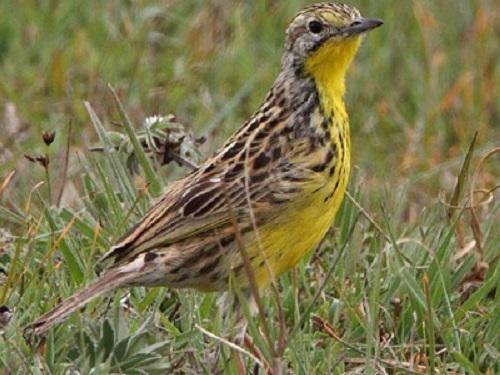Mercy Nyambura Kariuki
Other projects
This project aims to increase the impacts gained from implementing the first and second sheep for longclaw projects. Activities that will be undertaken will contribute to continued efforts of conserving grassland dependent species especially the endemic Sharpe’s Longclaw (Macronyx sharpei) found in the Kinangop highland grasslands.
Specifically, the aims include to:
• Increase the acreage of grassland farms under the conservation scheme through giving breeding rams to an additional 20 farmers;
• Document and educate farmers on the best sheep management practices through repeating and expanding the full de-worming programme; and
• Use the existing community programmes to capture market opportunities through building the capacity of farmers and local youths to locally add value to wool.

Longclaw ©Charlie Moore.
Kinangop Plateau in Kenya is internationally recognized as an Important Bird and Biodiversity Area as it hosts among others, Sharpe’s Longclaw (endangered) and Aberdare Cisticola (vulnerable). Kinangop highland is also important for agricultural and livestock farming, the grasslands provide pasture, water-holding and carbon storage services.
The proposed work is aimed at increasing grassland cover and quality through advancing the ‘sheep for longclaw’ project as well as empowering sheep farmers in Kinangop to contribute towards conservation of Kinangop grasslands and the grassland birds, especially Sharpe’s Longclaw. This follow-up project will expand the incentives to more farms and train local wool spinners to add value to sheep products. To highlight activities that will be carried out within this project:
• Conduct basic bird and grassland (structure and quality) survey to local youths to engage them in conservation work;
• Include more sheep farmers in the ‘sheep for longclaw’ scheme as well as in the deworming programme to improve their sheep management practices;
• Conduct workshops that will invite local farmers, veterinary and conservationists. The aim of the workshops will vary from introducing the project, sharing results at the end as well as training farmers on proper management practices that are suitable to them;
• Train local youths on wool spinning and weaving to increase skilled personnel at Njabini Wool Crafters workshop to ensure that wool received from farmers is processed;
• Increase environmental education and awareness to school pupils and students and the local residents through barazas;
• Strengthen links with relevant national and county government ministries/offices.
It’s expected that the outcome of this project will include:
• A database of the remaining grassland patches and population of grassland birds;
• A total of 20 farmers who control ownership of 500 acres of grassland provided with improved breed rams;
• Documentation of the lessons learnt show casing the link between livestock management and grassland conservation in Kinangop;
• Increased awareness on importance of grassland conservation.